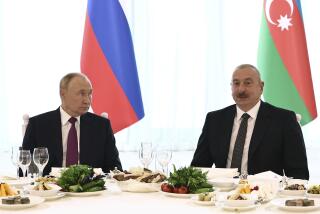Soviet Envoy Tries to Clarify Use of Army in Azerbaijan
- Share via
WASHINGTON — Anxious to retain U.S. understanding of Moscow’s military crackdown in Azerbaijan, Soviet Ambassador Yuri V. Dubinin told a hastily called news conference Monday that Soviet forces intervened in the ethnically divided region only to end bloodshed and restore peace.
Dubinin specifically denied that troops had been sent in to crush a takeover attempt by Azerbaijani nationalists, as the Kremlin’s top military officer said last week.
The conflict in Azerbaijan included “an orgy of killings and pogroms, violations of elementary law and armed ethnic clashes on a large scale,” Dubinin said. “It is an inter-ethnic conflict, an inter-national conflict, not a religious conflict or otherwise.”
The United States has said that restoring order between warring groups is a legitimate exercise of power. But Washington also has warned that cracking down on peaceful demonstrators who seek greater freedoms or independence, as in the Baltic states, would be wrong and would damage U.S.-Soviet relations.
In response to questions, Dubinin also said:
While the Soviet economy has not yet begun the radical recovery sought by reform programs, national income rose by 2.4% and production increased by 1.5% last year. If true, this is contrary to Western expectations. Swedish economist Anders Aslund estimated that Soviet national income fell 5% last year.
-- The Soviet government is not so preoccupied with its internal problems that foreign affairs must slow down. “We want arms control (talks) to go faster,” he said. “We can be very, very responsive to any initiative” carried to Moscow by Secretary of State James A. Baker III on his visit next week.
Dubinin’s effort to explain why the Soviets moved into Azerbaijan seemed intended to put an end to a flap created by Defense Minister Dmitri T. Yazov, who suggested Friday that the Red Army intervened to maintain Communist power there.
Yazov told Soviet journalists in Baku, the Azerbaijan capital, that military force was necessary to crush Azerbaijani extremists who had established “the structure of power . . . in all offices and enterprises” in the republic. He said the Azerbaijan Popular Front was about to announce its takeover as Soviet troops arrived.
But on Saturday, Foreign Minister Eduard A. Shevardnadze contradicted Yazov, insisting that Soviet troops moved in only to quell ethnic violence with neighboring Armenia.
The U.S. government was reluctant to criticize Yazov’s remarks. It initially reserved comment while studying the issue, and on Monday, State Department spokesman Richard Boucher first noted the Shevardnadze statement.
Only under questioning did Boucher acknowledge that “certainly we found those comments (by Yazov) disturbing, especially so if they represent accurately Soviet policy.”
Boucher then spelled out again the U.S. view that there is “a fundamental difference between the short-term use of force to restore order among ethnic groups in violent conflict and the use of force to suppress peaceful and legitimate political expression.”
“At the same time, we recognize the right of any state to ensure the safety of its citizens,” Boucher added. “As the bloodshed ends in the Caucasus, we believe that peaceful political dialogue should be the means by which the underlying causes of the conflict are resolved.”
More to Read
Sign up for Essential California
The most important California stories and recommendations in your inbox every morning.
You may occasionally receive promotional content from the Los Angeles Times.










